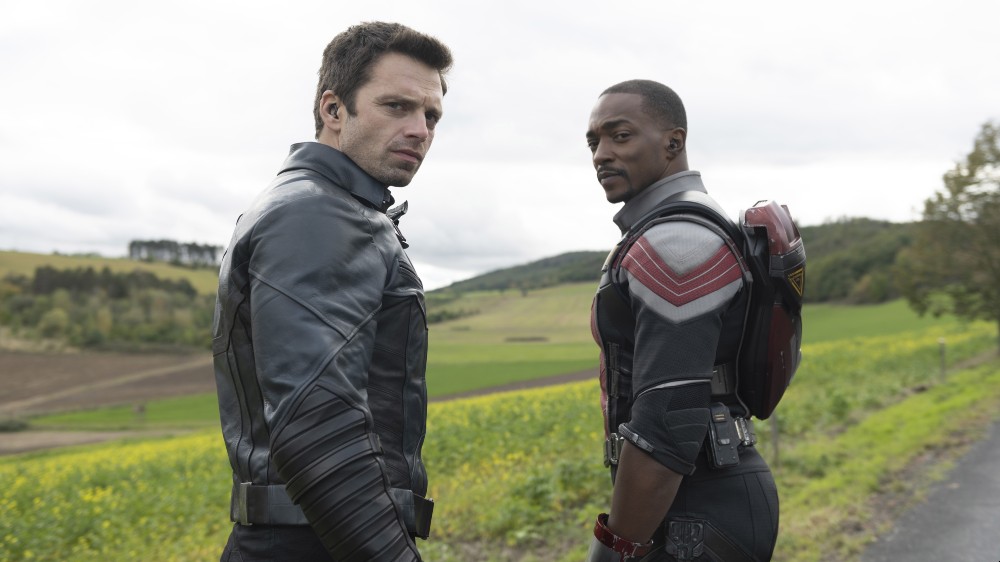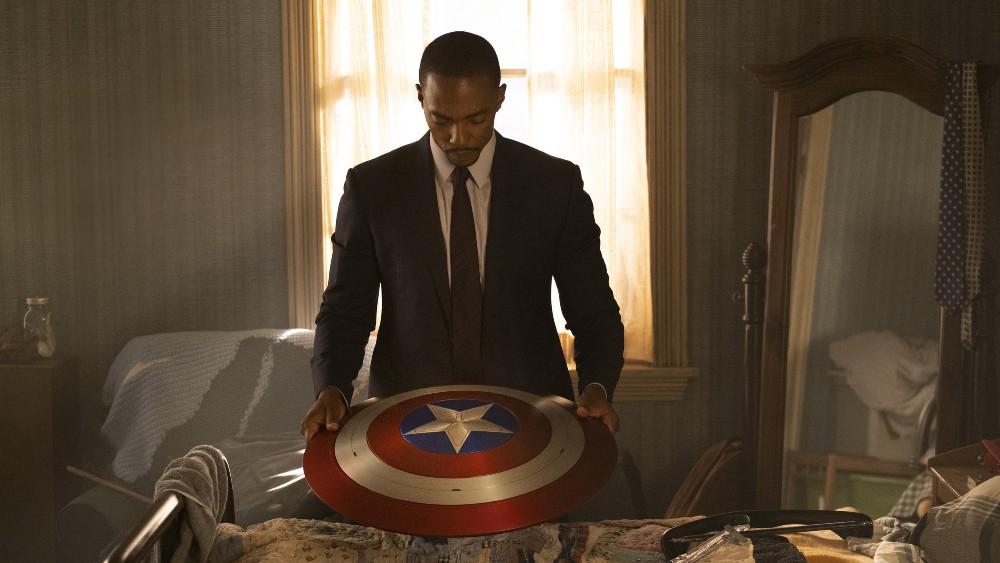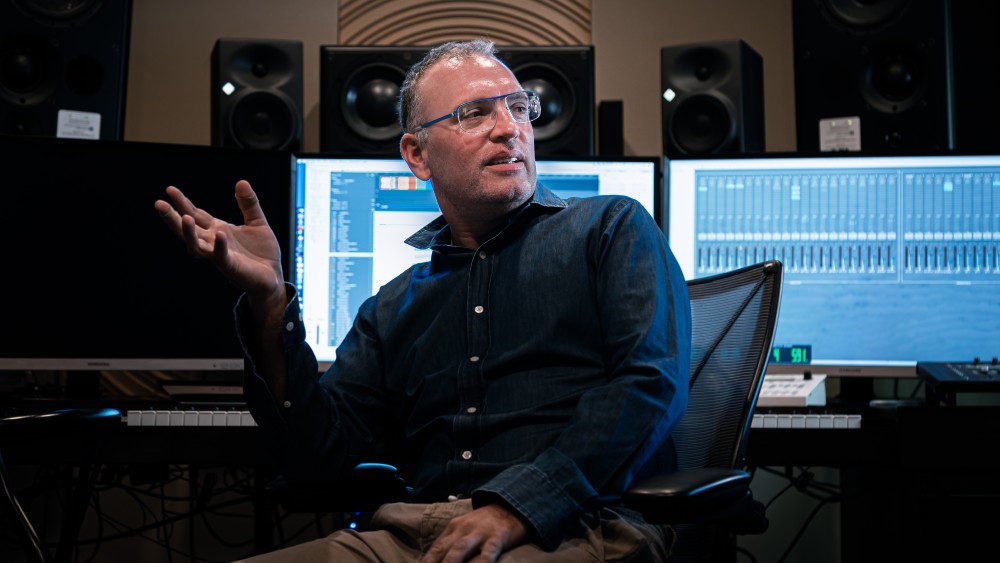
Some might consider Composer Henry Jackman to be the “Animation Guy,” having won two Annie and three ASCAP Awards for his work on films like Wreck-It Ralph and Big Hero 6. Or maybe they know him as the “Comic Book/Superhero Guy” with a long list of such movies, including Kick-Ass, X-Men: First Class, and Kingsman: The Secret Service, all with director Matthew Vaughn. Despite having done many of those films, Jackman is constantly reinventing himself by doing the music for such diverse films as The Interview, Kong: Skull Island, American Skin, Mosul and Pokémon Detective Pikachu.
Jackman’s work with Joe and Anthony Russo might be considered one of his higher benchmarks, though, and having scored both Captain America: The Winter Soldier and Captain America: Civil War, it only made sense for the British composer to also compose the music for the Marvel Studios/Disney+ series, The Falcon and the Winter Soldier, which just wrapped its six-episode season a few weeks back.
For those who have been following the “Marvel Cinematic Universe,” the Falcon is Anthony Mackie’s Sam Wilson, while the Winter Soldier is Captain America’s former superhero partner, Bucky Barnes, as played by Sebastian Stan. After the events of 2019’s The Avengers: Endgame, the two heroes have tried to go their separate ways but are pulled back together by the responsibilities of carrying on their pal Steve Rogers’ legacy. At the same time, there’s a new Captain America, as played by Wyatt Russell, and a group calling themselves the Flag Smashers, who have gotten their hands on Cap’s Super Soldier serum and are using it to carry out their own form of justice for those who have been wronged by society.
Below the Line spoke with Jackman mostly about his work on The Falcon and the Winter Soldier in the Zoom interview that follows. (Note: There are definite spoilers for the Disney+ series if you haven’t had a chance to watch it yet.)

Below the Line: You’re no stranger to superheroes having scored two of the Captain America movies with the Russos. Did you already have musical ideas for what you might do when you heard they were making a Falcon and the Winter Soldier series?
Henry Jackman: Once I knew I was doing the series and given that, like, as you pointed out, a lot of the characters are ones that I’ve met before and I’m familiar with, even if their narrative journeys now in a different place. It was an opportunity to have your cake and eat it really. People who know the scores well will hear how the Falcon theme got transformed into a big superhero thing called “The Louisiana Hero.” There are statements from the Civil War score, statements from the Zemo theme, even Steve Rogers Captain America statements, Winter Soldier crazy, you know dissonant callbacks with “The Scream.” Then there’s new musical material for the civilian Bucky that’s a lot more empathetic than his Winter Soldier sonic craziness, anarchic, robotic weirdness, and the Flag Smashers [theme] is an entirely new combination of the sort of idealism and dystopian fanaticism. It was a real mix. Apart from everything else, I’ve written so much music since Winter Soldier and Civil War. I spent a good time going through, trying to remind myself of all the different harmonizations and all the different motifs. And then talking to the filmmakers and getting a plan going for the new material, and it was just a really cool combination of revisiting the past, taking things from the past and reimagining them and recontextualizing them as brand new material. So you couldn’t really ask for more, really, as a process.
BTL: I recently spoke with Tom Holkenborg who scored Godzilla vs. Kong, and he told me he wasn’t allowed to use themes from previous monster movies in his score. You had the luxury of having written the themes for many of these characters in the first place, but does that mean those themes can’t be used in other Marvel things you don’t score yourself?
Jackman: It has nothing to do with me. Sometimes it’s a creative thing. Alan Silvestri is like a hero of mine from Day One, when I first started becoming interested in film score. His score for Captain America:The First Avenger is amazing and perfectly fits the period. It’s like a period movie, where he’s an uncomplicated patriot in a world that was not politically-complicated, where the Nazis are the bad guys, and the Americans have moral superiority, as that’s probably what the world felt like in 1940 whatever it is. When I did Winter Soldier, because it’s now contemporary, and the Russos have such a different tone. Despite how brilliant Alan’s score was — apart from a cue that we managed to put right at the beginning, which I really wanted to do as a homage, both to Alan and to where Steve Rogers came from — because the modern nature and the tone of the movie was so different, it wasn’t possible to use any of the DNA from before, so who knows? I haven’t seen the new Godzilla. It’s either that sometimes you work on a project and the tone has changed so much, so the themes that worked great don’t work. And sometimes it’s I don’t know, for technical reasons, but one thing it isn’t to do with is that it hasn’t to do with me.

BTL: Where were some of the conversations you had with the director, Kari Skogland, and Showrunner Malcolm Spellman, as far as the direction they wanted to take the show and music?
Jackman: Oh, loads. I mean, detailed discussions about the burden of the shield, what it means for an African-American. I mean, the Isaiah Bradley scenes to me are amazing. I can’t think of anything comparable. I may be wrong, but I feel like I’ve nearly seen every single frame of everything Marvel has done, and I don’t think that… the discussions between Isaiah Bradley and Sam Wilson, about that incredible dilemma that Sam’s got. Because when someone of Isaiah Bradley’s stature says they will never let a black man pick up that shield and even if they did, no self-respecting black man should pick it up. The sort of complicated burden for Sam compared to Steve Rogers. Do you remember that scene where Bucky goes, “Okay, I now understand how complicated that is as a white dude” and “Come on, Sam, for God’s Sake? Why did you turn down the shield? Stand up like a man and just get on with it. What’s so complicated?”
I hope all viewers, having watched all six episodes, understand that it’s a much more complicated legacy for an African-American. Those scenes, I had to be so careful with the music, and those Isaiah Bradley scenes, because not only is the subject matter of historical and social importance, the actual performance of the actor is unbelievable. Sometimes music you want to be narratively invasive — it’s a big superhero moment and you get stuck in musically — and with a scene like that, it’s so critical what the content is, and that you don’t over egg what is a stunning acting performance. Those cues are quite challenging, to be there and to support but not to get in the way of something I felt was really important. Those discussions were had. Flag Smashers obviously were new, so long discussions about that, the musical balance between something that had a little bit of melodic aspiration to it, because you need some sympathy. The great thing about the Flag Smashers, it’s not like the Emperor from Empire Strikes Back.
BTL: Or even the Red Skull in the first Captain America movie.
Jackman: You could do a more classical arch-villain, but her political objectives to start with, you could find admirable. What becomes questionable is the way she goes about it. The Flag Smashers are a mix of heady, young, idealistic fanaticism, and sort of increasingly violent ways of trying to execute their intentions. That’s musically interesting. We had a long discussion between Kari and Jeffrey Ford, the picture editor, on combining abstract, dystopian, techie kind of cool textures that represent them being a bit anarchic and young, but also having this thematic theme, which grows throughout the series that represents their idealism. Because don’t forget, by the end of the show, the wisdom of the new Captain America, Sam Wilson. is not that he’s celebrating, having dispatched the Flag Smashers, but trying to encourage authorities to understand that whilst they were misconceived in how they went about it, there is a reason those guys had support and there’s something to what they were trying to achieve
Some of these subtleties in the writing really affect the music, and it means that you can have this nuanced approach to, for example, that final speech that Sam Wilson gives, I call that track on the CD “Captain America.” Now, normally, Captain America, you’d think of rousing but it’s a compliment to the show that it’s a much more thoughtful sort of philosophical piece, because in a way, the apotheosis or the culmination of him demonstrating he is… first of all, you see Sam go through all the headache, and the journey he has to go through to feel like he can pick up the shield, and then when he has his Captain America moment, sure, it’s the action moment and the saving, and the physical prowess. But really, it’s the philosophical climax where he demonstrates the sort of wisdom lacking in some of the political leaders. So that’s all great for music, because it means the depth inherent in the show and in the writing has to be reflected in the music. So I’m very grateful for that.

BTL: I’m glad that the show was able to get more into Sam Wilson’s mindset. I’ve been a fan of the Falcon since I was a kid, and they didn’t really have enough time with him as Captain America in the comics to explore those things. What were some of the challenges of scoring most of this during a pandemic, and what are some things you did that you might continue post-pandemic?
Jackman: In a nutshell, it was challenging, but I mean, nowhere near as challenging… I can’t imagine, because the great thing about writing music is you tend to be in a room writing music. Compared to what they had to do. God knows what they were dealing with on location and all the complications to make it happen. It’s like a miracle they got through it and made it all work without any compromises. So compared to that, it was small-fry, but yeah, the delays in moving forward and also just trying to figure out liaising with the filmmakers and getting it recorded, but you’d be amazed. Look, we’re busy using Zoom and having a conversation. It’s not as great as meeting in person, but I would say if anything, I was surprised and heartened by how quickly the tests stopped being something I was thinking about, and it just felt like working on a Marvel show. I didn’t feel any of that logistical problems, hampering the creative flow of things. I guess human beings, we’re quite good at adapting ultimately.
BTL: I understand you’re returning to animation, scoring Ron’s Gone Wrong, and you’ve basically bouncing between superheroes and animation, with Comey Rules being something different. Is there any other genre you’d like to explore with your music or other challenges?
Jackman: Yeah, for sure. I don’t know if you saw Cherry, but that was in a completely different universe. What wasn’t a different universe was working with Joe and Anthony Russo, but they were doing something very different than what I’ve been doing previously. So that was way off the beaten track in a really good way. And yeah, you’re right, Ron’s Gone Wrong, I’ve lost track of when things are supposed to be coming out in these crazy times. The original plans aren’t quite exactly as they were, but yeah, that was enormous fun. I don’t know how much I’m supposed to say about it, so I probably won’t say too much other than when it comes out, it’s got a musical tone that’s certainly unique, and I spent a long time on it. It doesn’t sound like anything else I’ve done.
BTL: Since we’ve never spoken before this, I’m curious about your preferred way of writing? Do you like sitting at a piano or do you sit at a computer? Do you have different ways of writing to come up with themes and melodies?
Jackman: First, it completely depends on what it is. In the case of finishing… “The Louisiana Hero” was a full superhero tune that started from a motif I had from Winter Soldier, but it was just one phrase. When it’s something like that, I want to be on the piano, because I just want to nail it with no bells and whistles, no arrangements or anything. It’s really just finding the melody and finding all the harmony, that sort of thing you definitely want to do on the piano. Something that’s dystopian and mad like a lot of the Winter Soldier before it comes to the more orchestral stuff, some of that crazy anarchic stuff that was in Winter Soldier, that’s a lot more messing around with computers and production and everything, because you’re creating fabrics and textures. It’s really horses for courses, when you’re creating a kind of sonic landscape identifiable with a group of characters, there’s going to be a lot of computers and processing. When you’re nailing a melody that you want to be able to use in a million different ways and rearrange and reharmonize, that sort of thing, it’s like back to basics, where you really just want to be on the piano. So it depends what you’re up to. I would definitely say that it’s good to force yourself to stay on the piano when it’s a good old-fashioned melody, because you’ve got nowhere to hide. You have to get the notes right.
BTL: Do you have a little recorder where you can keep track of melodies and tunes or other ideas?
Jackman: I just hit Voice Memos on the iPhone when I get a half decent idea,
BTL: Is there a way to keep track of them or do you just have to listen through them to find things?
Jackman: Well, according to my iPhone, as long as I keep doing my iCloud backup, they should be backed up somewhere. I think I’ll probably shoot someone if it was that, “Oh, I’ve lost them all.” However, I’m thinking don’t voice memos end up… hopefully I’ve set my iPhone up correctly then I should be able to throw my phone in a fire, and they still exist somewhere. Now you’ve mentioned I might actually check that out and make sure that’s the case.
The Falcon and the Winter Soldier is now streaming on Disney+. As a matter of fact, so is Captain America: The Winter Soldier and Captain America: Civil War. You can also watch the end titles sequence for Jackman’s “Louisiana Hero” piece below:
All photos courtesy of Disney and Marvel Studios.





